 Organ of Alliance
Marxist-Leninist (North America)
Organ of Alliance
Marxist-Leninist (North America)
Volume 1, Issue 6; August 2003 $1.00
A L L I A N C E ! A Revolutionary Communist Monthly
Where We Stand:
Beria and the Berlin Rising of 1953
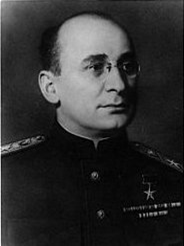
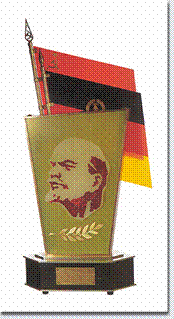
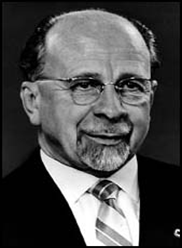
Laverenti Beria
Flag GDR
-Bust Lenin
Walter Ulbricht
Fifty years after, the risings and
riots, of the working class in June 1953, across the German Democratic republic
(GDR) - notably in Berlin, remain controversial amongst Marxist-Leninists.
Some argue this was a genuine revolt of the German working class. Others,
supporters of post-Stalin USSR, argue they were imperialist provocations.
Alliance Marxist-Leninist will argue that:
i) They were a genuine resistance by the German working class
against a revisionist bureaucracy; that the revolt was precipitated by a
criminally ultra-leftist policy of Walter Ulbricht;
ii) Lavrenti Beria representing the Marxist-Leninist wing of the Politburo,
urged a sectarian Ulbricht back towards a path described by J.V.Stalin;
iii) Beria agreed with Stalin that the German state was in the special
circumstances of post-war Europe, a buffer against imperialism.
The Charges Against Beria
When the revisionists led by Khrushchev, took control
of the USSR state, they were hampered by waverers (Malenkov and Molotov),
but actively resisted by staunch Marxist-Leninists (Beria). Unless Beria
was eliminated, the state would return towards its Marxist-Leninism. Charges
against Beria, were laid out in secret sessions of the full Central Committee
of the CPSU(B) from 2-7 July 1953, some four months after the death of Stalin,
but only two weeks after the June 16-17 anti-communist uprising in East
Berlin.
The leading charge concerned the establishment of a
secure intelligence base for Marxist-Leninist vigilance. Another series
of charges alleged traitorous relations with Tito and attempts to normalize
relations with Yugoslavia (Amy Knight: Beria Stalin’s First Lieutenant;
Princeton 1993; p.206). But a prominent charge regarded Beria’s advocacy
of a “unified Germany”. Leading the charge against Ulbricht’s sectarian
polices was Beria, who was “indignant when I (Ulbricht) opposed the policy
concerning the German question in 1953”: Knight Ibid; p. 192). Several
sources point to the significance of this charge:
“The Soviet leadership offers the following reasons for the charges
against Beria. . . . ‘ that he advocated the creation of a unified Germany
as a "bourgeois, peace-loving nation" (1:162) and the abandonment of East
Germany's status as a separate, socialist state;” [On the Crimes and Anti-Party,
Anti-Government Activities of Beria.] Plenum of the Central Committee
of the Communist Party of the Soviet Union, 2-7 July 1953, from Izvestia
CC - CPSU:1991, 1:140-214 & 2:141-208. New Evidence on Beria's Downfall,
by Rachel A. Connell.
“New accounts confirm that Beria did want to trade German reunification
for neutralization.” ‘New Evidence on the East German Uprising of 1953; ”Paper
#3: Reexamining Soviet Policy Towards Germany During the Beria Interregnum,
“Cold War History Project” by James Richter.
What were Stalin’s views on East Germany and West Germany?
We trace this through the famous wartime Allied Heads meetings of Tehran
(November 1943); Yalta (February 1944), to the post-war Potsdam
meeting (July 1945). Here, Stalin was face to face with Prime
Minister Churchill and President Roosevelt, and at Potsdam,
President Truman.
Continued on page two.
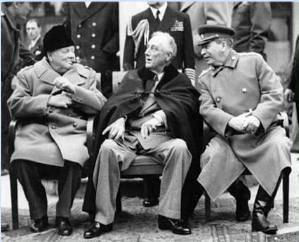
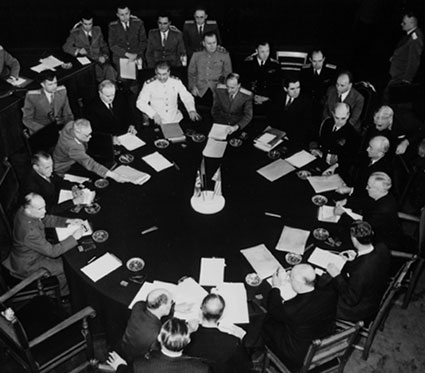
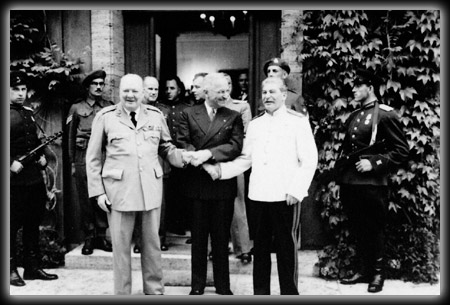
Churchill, Roosevelt & Stalin at Yalta
Conference
The Potsdam Conference
Churchill, Truman, and Stalin at Potsdam
Stalin’s German Policy
It is alleged that Stalin held barbarous views on Germany.
For example, it is said that during a dinner conversation at the Tehran
Conference, the conversation turned to Germany. Stalin, concerned that the
future Germany might once more attack Eastern Europe and Russia, joked that
German officers be liquidated:
“To prevent this catastrophe…. from 50,000 to 100,000 German
officers must be liquidated, and the Allies must retain control of strategic
points around the world in order to stop German operations. Was Stalin joking
about shooting 100,000 officers?… Churchill took Stalin seriously…..Roosevelt
thinking that he could smooth things over with a joke of his own, proposed
that instead of 50,000 officers being shot, they should shoot only 49,000.
By now Eden, sensing that in his anger Churchill would make remarks he would
later regret, tried to signal that it was just a joke.” Eubank K; Summit
at Tehran – The Untold Story; New York, 1985; p. 314-5.
Charles Bohlen, the USA diplomat and interpreter,
corroborates that Stalin’s remark was a joke. Nonetheless, this “joke” has
been converted into the “fact” that Stalin demanded the heads of 100,000
soldiers. Furthermore, that he was responsible for the subsequent division
of Germany into East and West. British and USA imperial inspired histories,
take as a given that at the end of the Second World War, Stalin was intent
upon destroying Germany:
“Stalin and Roosevelt were both strongly in favor of splitting
up Germany in order to render here helplessly weak. Churchill did not think
that this was an important issue”.Martin Kitchen: British Policy towards
the Soviet Union During the Second World War; London 1986; p. 175.
But the reality is not quite so clear. Firstly, even shrewd enemies of
the USSR, recognized the situation that Russia had found itself over the
war years. As Averell Harriman, the USA Ambassador to Russia, warned:
”Our difficulties with the Russians if any, will be that their
present intent towards Germany is tougher than we have in mind, particularly
in regard to the magnitude of reparations. Their measure of Germany’s capacity
to pay reparations in goods and services appears to be based on the concept
that the Germans are not entitled to a post-war standard of living higher
than that of the Russians”. W.A. Harriman, and E. Abel. Special Envoy to
Churchill & Stalin 1941-1946: New York; 1975; p. 249.
Harriman had no difficulty in believing the sincerity
of Stalin’s views, and from where they arose:
“Harriman felt that Stalin’s fear of a resurgent Germany was
entirely genuine.. “I am satisfied that his concern was real..“
Harriman & Abel; Ibid; p. 273.
At Tehran, Stalin did not push the agenda of a division of
Germany. Instead he “did not think much of either” of the leaders’ plans,
preferring that of Roosevelt – over Churchill’s Danubian Confederation; if
he had to choose between the two:
“Roosevelt talked of dividing Germany into five separate states
. . . Churchill’s .. plan was less sweeping. He agreed that Prussia should
be detached from Germany. . .. Stalin. . . did not think much of either
idea, though he said that of the two he preferred Roosevelt’s. The trouble
with fitting any part of Germany into a larger confederation, was that this
would merely encourage…. And recreate a great national state”; Harriman
& Abel Ibid; p. 280-281.
At Yalta, Roosevelt revealed that the British
insisted upon a French role in Germany:
“The British were attempting to build France up into a strong
power to hold the eastern frontier while the British assembled a large force.”….Stalin
asked if Roosevelt thought that France should have a zone of occupation
in Germany, The president dmitted that it was “not a bad idea, but he added
that it was only out of kindness”; Stalin & Molotov agreed”; Eubank K;
Summit at Tehran; NY 1985; p. 475.
Roosevelt’s dismemberment of Germany became accepted.
Again, the “given version” that Stalin pushed for dismemberment of Germany,
is false:
“The myth that Europe was divided up in the Crimea (Yalta). Is
totally inaccurate… The Soviet side expressed its doubts that dismemberment
was realistic. As a result it was decided in Yalta to refer that question
to the European Consultative Commission.” Berezhkov, V.M., At Stalin’s Side.
His Interpreters Memoirs; New York; 1994; p.275
The crux of the Yalta discussions was on reparations.
Both the USA and the UK imperialists tried to deny significant reparations
to the USSR. The USSR was devastated by the fascist invasion, contrary to
either of the other two allies. The imperialists wanted the post-war poverty
of the USSR. Therefore, Stalin explicitly linked the division of Germany
to the question of war reparation.
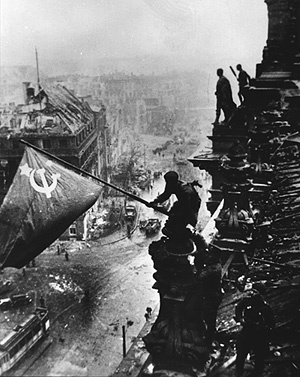
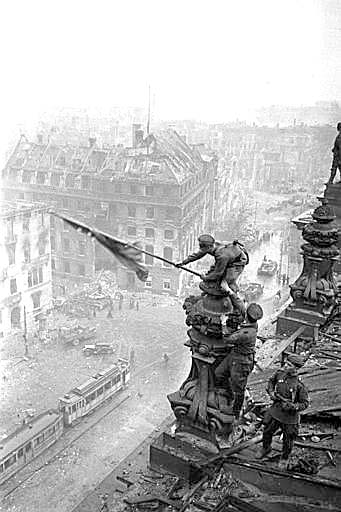
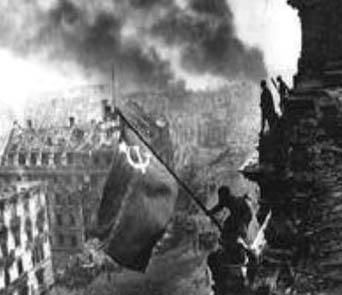
The Famous Raising of the Hammer and Sickle over
the Reichstag photographed by Yevgeny Khaldei ; May 2 1945
Race to the Elbe –Anglo-American
Attempts at a Separate Peace
Between the Yalta and Potsdam meetings, with the end
of the European war, only two major things had changed in the relationship
of the Three Big Powers to each other.
The first was the territorial control of the European
theater.
Russian insistence on a Second Front had long
been resisted, but when the imperial Allies saw that the Russians were sweeping
Continued on page three.
across Europe towards Germany, they agreed to set up
a Second Front, which radically changed the situation. Initially:
“The European Advisory Commission (EAC) had negotiated the zonal
agreements anticipating that the Red Army might control much of Germany”;
Eisenberg, Carolyn; The American Decision to Divide Germany 1944-1949; Cambridge
1997; p.72.
However after the Battle of the Bulge in December
1944 (In Ardennes against the USA and British) - the German High Command
started to move forces away from confronting the USA:
“The Nazi leadership unexpectedly shifted strategy. In a dramatic
attempt to check the Russian advance, they began moving their armies from
the Western Front and reducing their resistance to SHAEF (the Allies). By
the end of March less than 30 German divisions were facing the Americans,
and British, while more than 150 divisions were battling the Soviets in
the East”;
Eisenberg Ibid; p.72.
Moreover, the Germans began making overtures of a separate
peace with the Americans & British. Although this was quite against
the protocols of Yalta, the Americans and British responded positively:
“Ambassador Harriman has communicated to me a letter … from Mr.
Molotov regarding an investigation being made by Field Marshall Alexander
into a reported possibility of obtaining the surrender of part or all of
the German army in Italy. In this letter Mr. Molotov demands that, because
of the non-participation therein of Soviet officers that this investigation
to be undertaken in Switzerland should be stopped”;
March 25 1945; President Roosevelt to Marshall Stalin; In Correspondence
Between the Chairman of the Council of Ministries of the USSR, and the Presidents
of the USA, and the Prime Ministers of Great Britain During the Great Patriotic
War of 1941-45; Moscow; 1957; Volume 2: p. 188.
Against American protestation, Stalin was explicit about
violations to the Yalta Agreement, and danger to the Russian troops. He
charged this “engendered distrust”:“
”I must tell you … that the Germans have already taken advantage
of the talks with the Allied Commanders to move three divisions from Northern
Italy to the Soviet front. The task of coordinated operations involving
a blow at the Germans from the West, South and East, proclaimed at the Crimean
Conference (Yalta –Ed) is to hold the enemy on the spot and prevent him
from maneuvering, from moving his forces to the points where he needs them
most. The Soviet Command is doing this. However, Field Marshall Alexander
is not. This circumstance irritates the High Command and engenders distrust”;
Premier J.V.Stalin to President Mr. F. Roosevelt; p. 190.
As President Roosevelt prevaricated, Stalin became ever
more explicit:
“You are quite right … that “the matter now stands in an atmosphere
of regrettable apprehension and mistrust”. I realize that there are certain
advantages resulting to the Anglo-American troops from these separate negotiations
in Berne .., seeing that the Anglo-Americans troops are enabled to advance
into the heart of Germany almost without resistance, but why conceal this
from the Russians, and why have the Russians, their allies not been forewarned?
And so what we have at the moment is that the Germans on the Western Front
have in fact ceased the war against Britain and America. At the same time
they continue the war against Russia, the Ally of Britain and the USA”;
Marshall Stalin to the President Mr. Roosevelt; April 3 1945.
Stalin understood that the game was about control of
key industrial parts of Germany:
“It is hard to agree that the absence of German resistance on
the Western Front is due solely to the fact that they have been beaten.
The Germans have 147 divisions on the Eastern Front. … They are fighting
desperately against the Russians for Zemlenice, an obscure station in Czechoslovakia,
which they need just as much as a dead man needs a poultice, but they surrender
without any resistance such important towns in the heart of Germany as Osnabruck,
Mannheim and Kassel”; Premier Stalin to President Roosevelt April 7 1945;
p. 198.
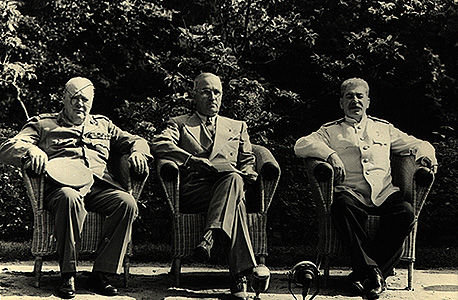
Churchill, Truman and Stalin at Potsdam
1945
The Atomic Bomb Changes the Geopolitical Reality
The second major change, between Yalta and Potsdam,
was the atomic bomb.
Prior to this, the USA and the British relied upon the
USSR to destroy fascism. Will Thorp, Deputy Assistant Sec. State
Econmics had said:
“It is by now a commonplace, that Germany cannot commit another
aggression so long as the Big Three remain united”;
The essence of the US pre-atomic security policy for Europe was just that
– an agreement sealed at Yalta for joint control of Germany by the US, and
the USSR (together of course with the lesser great powers retain, and with
the still lesser power France).”
Alperowtiz, Gar; The Decision to Use the Atomic bomb and the Architecture
of an American Myth; New York; 1995; p. 278.
By the time of Potsdam, the maneuvering of the imperialists
changed. The USA and the British were aware of what had happened, and why
the USSR needed help in re-building. As President H. Truman said:
“What you have to remember about Russia and its fear of another
war is that the Germans slaughtered 25,000,000 people not connected in any
way with the military. They ruthlessly wiped out everybody from the Polish
border to Leningrad and Moscow”; President Truman April 1946; cited; Alperowtiz;
G; Ibid; p.289.
Now, with the Russians forced to fight arduously into
Berlin, the USSR was no longer indispensable for the ruthless Allies. Having
made commitments at Yalta, for reparations to the USSR, the USA tried to
renege on their promises:
“The fundamental question in dispute at Potsdam was … whether
to fulfill Roosevelt’s Yalta understandings whereby the Soviet Union was
to receive reparations of roughly ten billion dollars from Germany. . . .
The position the US delegation now took was “No”. The basic Roosevelt position
was simply abandoned… Indeed, although Red Army help to control Germany
had once seemed essential, the US now became quite cavalier in its negotiations...
Nor is there any doubt about what produced this revolution. At Potsdam,
US leaders explicitly stated their private judgment that the atomic bomb
had given them power to control all security problems – including the once
central German threat”; Alperowtiz, G; Ibid; p. 281.
In fact, at Potsdam, despite the pressures put on by
the imperialists, Marshall Zhukov notes that Stalin had resisted pressures
to divide Germany:
“The question of the Germany into three states: Southern Germany,
Northern Germany, Western Germany raised for the second time by the US and
British delegations came in for serious debate. The first time they brought
this up at the Yalta Conference it was rejected by the Soviet delegation..
. . At Potsdam, Stalin again rejected this: “We reject this proposal, it
is contrary to nature: Germany should not be dismembered, it should be made
into a democratic, peace loving state. . . I must say that Stalin was
extremely scrupulous
Continued on page four.
with regard to
the slightest attempt by the US and British delegation to take decisions to
the detriment of the Poland, Czechoslovakia, Hungary and the German people.
He had particularly sharp
controversy with Churchill…"
Zhukov G: Marshall
of the Soviet Union; Reminiscences and Reflections” Moscow 1984; vol. II,
pp. 447; 449-50.
By the end of the Potsdam Conference, it was clear that
the Americans were determined to place an imperialist presence in West Germany.
This meant that the German state was inevitably to be divided. One aim of
the imperialist was to limit the amount of reparations to the USSR, so they
insisted that all reparations were to be made from the Zones of occupation.
Thus, the USSR was excluded from the Saar and the Ruhr industrial belts.
Molotov pointed out that the bulk of the wealth of Germany was in the zones
to be occupied by the imperialists, but to no avail. The implication of ‘separate’
reparations was the division of Germany:
“In view of the American aims, the gravest flaw in the reparations
scheme was its threat to German unity. …. both Molotov and Ernest Bevin
(British Foreign Secretary -Ed) had pointed out the incompatibility of Byrnes’
(James Byrnes, US Secretary State -Ed) proposal with the plans for economic
integration”;
Eisenberg, C Ibid; p. 114.
Despite the devious tactics of the imperialists, the
Russians led by Stalin and Molotov were determined to try to achieve a unified
Germany. To this end, they “gave ground”. So much so that the Americans found
themselves in a difficult diplomatic position:
“In a personal letter to General Eisenhower, Ambassador Walter
Bedell-Smith described the US delegation’s discomfort. Observing that Molotov
had begun to make concessions, Smith reflected that “the difficulty under
which we labour is that in spite of our announced positions, we really do
not want nor intend to accept German unification in any terms that the Russians
might agree to, even though they seemed to meet most of our requirements”.
The real problem was the Soviets would interfere with the German contribution
to the Marshall Plan. However the US was in an exposed position,
and it would “require careful maneuvering to avoid the appearance of inconsistency
if not hypocrisy”;
Eisenberg ibid; p. 359.
Molotov pointed out that that the US and Britain were
retarding the recovery of the Western controlled Germany. He openly stated
that:
“The question of the creation of a Government for the Western
zones has already been decided by the USA”;
Eisenberg Ibid; p. 357.
By 1948, the:
“Americans and British were resolved: There would be two Germanys.
For the foreseeable future eastern zone would be left to the Russians, while
the western zones would become a separate state. Together the two powers
devised concrete plans for making West Germany a reality”; Eisenberg; Ibid;
p. 363.
The imperialists began to further sabotage the plans
made together with the Russians for a peaceful and united Germany. They attacked
the joint quadripartite currency reform plans. In this tense climate, the
Russian representatives in the city of Berlin and the Russian zone, created
an opening for the Americans. Marshall Sokolovsky for the Russians
on the Allied Control Commissions adjourned the Commission, in effect walking
out. This gave the USA General Clay a reason not to submit to Russian approval
for currency reforms.
The tension rose still further when USSR General Dratvin
imposed on April 1 1948, a traffic blockade from the western zones to
the eastern zones. Again, provoking this rupture played into Americans hands.
Therefore, the Americans refused to call the Allied Control Commission to
discuss matters. This bluff became the propaganda coup of the Berlin airlift.
Meanwhile, Clay charged that the Russian were creating a separate East German
Government, a false charge that Assistant Sec. State Lovett relished to:
“Clearly shift responsibility to Soviets for splitting Germany”;
Eisenberg Ibid; p. 396.
Yet, even now, Stalin continued to work for unification,
as witnessed by his famous letter to Senator Henry Wallace, who had
argued for unification of Germany. Stalin:
“Despite the differences in economic systems and ideologies
the coexistence of these systems and the peaceful settlement of differences
between the USSR and the USA are not only possible but absolutely necessary”;
Eisenberg Ibid; p. 405-6.
On July 14, 1948, a Russian governmental note asking
for restoration of unity discussion while easing travel restrictions to and
from Berlin was dismissed. Even then, Stalin met with the three Western ambassadors
Walter Bedell Smith (USA) Frank Roberts (Britain); and M.Yves
Chataigneau (France). He offered them an immediate removal of the blockade,
with currency agreements, if immediate discussions re-started on German
unity (Eisenberg Ibid; p. 429-30). All to no avail, because again rather
conveniently, the Russian representative in Berlin, General Sokolovsky:
“Assumed the initial role of saboteur by reversing concessions
that had been offered in Moscow…. The Russians performance disappointed
General Robertson who though it so “fantastic” that he had so altered Stalin’s
commitment”. Eisenberg Ibid; p. 437.
The division into two German states achieved the imperialist
aim of forming a buffer zone for Cold War propaganda. This emphasized the
“divisiveness of communist intent”. Stalin had sought to frustrate this
goal. The German Democratic Republic (GDR) was formally established.
However, we argue that until his death, Stalin was anxious to re-establish
a unified German state. We move to the situation in 1952.
Stalin’s Meeting With the Politburo of the SED
German communists of the former KPD, returned to Germany
as the Soviet troops battled in. Under Soviet advice, the Social Democratic
Party (SPD) and the KPD merged to form one party – the German Socialist
Unity Party (SED), in April 1946. Stalin had several meetings with its’
leaders. By 1951‑52, thousands of inhabitants of the GDR were leaving
across the open inner‑German borderlines in Berlin. The East Berlin government
turned the freely passable East‑West German border into a guarded border
in May 1952. During 1952, more than 232,000 GDR residents went West.
Stalin clearly disapproved of the policies of the GDR
leaders. He warned them that they were undergoing a rapid rate of collectivization,
and alienating all the layers of society from peasants, to workers to intellectuals.
He also advised them that it was incorrect not to continue to work for a
unified German state. Finally, he specifically advised that the GDR was not
to be considered a socialist state. He used the formulation “beginning of
socialism”. [All these references are cited in full at the Alliance web site http://www.allianceml.com/STALIN-TXT/STALINTOULBRICHT.htm]
“Comrade Stalin says that you should say to your workers:
"We have just entered socialism. This is not full socialism yet, because
Continued on page five.
you have many private capitalists. However, this is the beginning
of socialism, a little piece of socialism, and a road to socialism. You
should show that you are closer to the workers than Adenauer's government“.
http://www.allianceml.com/STALIN-TXT/STALINTOULBRICHT.htm
Stalin fought for differentials to reflect that there was a ‘lot of private
capitalism’:
“Comrade Stalin …Last time it was found that in the GDR, the
ratio of workers' salary to the salary of engineering and technical personnel
was 1: 1.7. That is absolutely incorrect. It will doom your entire industry.
. . The engineer is engaged in intellectual work. He must have an apartment,
decent furniture; he should not be chasing a piece of bread. He should enjoy
a standard of living appropriate for a person who is engaged in intellectual
work. “Ibid.
Stalin insisted on voluntary
collectivization:
“Comrade Stalin …The kulaks should be encircled, and you should
create collective farms around them. In our country, organization of collective
farms was going on simultaneously with expropriation of the kulaks. You
will not need to do it this way. Let your kulaks sit tight, leave them alone.
In addition to the kulaks, you have poor peasants in your villages that live
right next to the kulaks. They should be pulled into production cooperatives.
… You will see for yourself that peasants will visit those collective farms
and watch how life will unfold in a new way. I noticed, said Comrade Stalin,
that you do not value peasants in your policy…… Do not force anybody to
join; if they want to, good. If they do not, do not force them.” Ibid.
Stalin staunchly
advocated German unity:
“You should continue propaganda for German unity in the future.
It has a great importance for the education of the people in Western Germany.
Now it is a weapon in your hands, and you should always hold it in your
hands. We should also continue to make proposals regarding German unity
in order to expose the Americans.” Ibid.
These stipulations are pretty concrete
and clear. Yet within 3 months of Stalin’s death, Ulbricht turned ultra-left-wards,
as noted by US Diplomat N. Spencer Barnes to the State Department
on 30 April 1953 (Uprising in East Germany 1953; Compiled by C.Ostermann;
Budapest; 2001; p.75).
And criminally so.
Ulbricht launched what has been called the “socialization“
of East Germany. In the way this was carried out, it resulted in the
total alienation of all sectors of the population- including the working
class and peasantry. There was a clear reversal away from Stalin’s advice,
in the polices being adopted in the GDR under the SED:
“In a 2 May 1953 memorandum, Semyonov, …within the Soviet
establishment, advised Foreign Minister Vyacheslav Molotov that because
"The Socialist Unity Party of Germany and the democratic forces in the GDR
have already strengthened and matured enough to manage independently the
leadership of the country," the maintenance of overt political control by
the Soviets could be sharply reduced. . . . Thus, in Semyonov's opinion,
there was no need to do anything but "to create more favorable conditions
for socialist construction in the GDR.";
Working Paper #11: The United States, the East German Uprising of 1953,
and the Limits of Rollback, by Christian Ostermann http://wwics.si.edu/index.cfm?topic_id=1409&fuseaction=library.document&id=441
Ulbricht ensured that a Central Committee resolution
on higher quotas for workers was passed, instructing that:
“All necessary steps to remedy the abuse in the sphere of work
quotas … and to raise those of importance… by an average of at least 10%
by June 1, 1953”;
A. Baring Uprising in East Germany June 17 1953; Cornell 1972; p.21-22
This overall leftist strategy was resisted by Beria.
The ground was laid for a revolt, which would play into the hands of the
imperialists. Since the death of Stalin, Khrushchev was determined to move
the state of the USSR into a position subordinate to USA imperialism. Ulbricht’s
policies played into this overall strategy.
The “Beria Plan”
to reverse Ulbricht’s Ultra-leftist Policies
Beria tried to reassert Marxist-Leninist control after
the death of Stalin. He was aware of the dangerous situation in Germany.
On May 27 1953, the Presidium of the Soviet Council of Ministers met to
discuss the situation in East Germany. The Council of Ministers, warned
of an imminent crisis, and blamed the incorrect polices of the SED. The
document is known as the “Beria Document”. It was dated prior to
the June 11 rising. [See Council of Ministers of the USSR Order; “On Measures
to Improve the Health of the Political Situation in the GDR”; 2 June 1953.
No. 7576-rs; Moscow, signed by Chairman of the Council of Ministers of the
USSR G. Malenkov. Hereafter: USSR Order 7576-rs. http://wwics.si.edu/index.cfm?topic_id=1409&fuseaction=library.document&id=26760
The “Beria Document”, as Ulbricht and the SED called
it, was a retreat from ultra-leftist “socialization”, and was forced upon
the SED. However, it did not go as far as Beria had wanted. Mainly this was
in regards to Beria’s fight to unify Germany:
“Divisions in the Presidium prevented the leaders from making
a decision … Molotov reports that Beria tried once more to get him to accept
reunification, but when this failed withdrew the proposal…. “Malenkov favored
reunification as a neutral country because he considered the division of
Germany artificial and contrary to the historical development of that country.
. .. Molotov, by contrast, focused on the traitorous character of Beria's
proposal ….” Richter, Ibid.
Albeit that USSR Order 7576-rs was not, in its final
form, exactly as Beria had hoped, the document was scathing about the SED
policies. It bluntly stated that the situation had been created by the serious
alienation of the German workers, peasants and intelligentsia, by the “incorrect
political line”. This had resulted in a “very unsatisfactory political and
economic situation”:
“As a result of the incorrect political line. . . There is serious
dissatisfaction with the political and economic measures carried out by
the GDR among the broad mass of the population, including the workers, peasants,
and the intelligentsia. This finds its clearest expression in the mass flight
of the residents of the GDR to West Germany. ..over the course of four months
in 1953 alone over 120,000. Many refugees are workers. .. It is remarkable
that among those who have fled to West Germany in the course of [the first]
four months of 1953, there are 2,718 members and candidates of the SED and
2,610 members of the Free German Youth League. “USSR Order 7576-rs.
It was emphasized that the SED was following ultra-leftist
decisions following the Second Conference. The polices flagged as incorrect,
included a forcing of the pace of industrialization,
Continued on page six.
and the forced collectivization, as well as simple abuses of restriction
of ration cards to “person in the free professions”:
“The social-economic measures which have been carried out
... include: the forcible development of heavy industry, which also lacked
raw materials; the sharp restriction of private initiative, which harmed
the interests of a broad circle of small proprietors both in the city and
in the country; and the revocation of food ration cards from all private
entrepreneurs and persons in the free professions. In particular, the hasty
creation of agricultural cooperatives in the absence of the foundations [necessary]
for them in the countryside led to: serious difficulties in the area of supplying
the population with manufactured goods and foodstuffs; a sharp fall in the
mark’s exchange rate; the ruin of a large number of small entrepreneurs-artisans,
workers in domestic industries, and others. It also set a significant stratum
of the populace against the existing authorities. The matter has gone so
far that at present more than 500,000 hectares of land have been abandoned
and neglected, and the thrifty German peasants, usually strongly tied to
their plots, have begun to abandon their land and move to West Germany en
masse.”
USSR Order 7576-rs.
In addition, serious errors were made in ideological
work, especially in regards to the clergy and to the intelligentsia:
“Serious errors have been committed with regard to the clergy,
evident in the underestimation of the influence of the church amongst the
broad masses of the population and in their crude administrative methods
and repression. The underestimation of political work amongst the intelligentsia
should also be admitted as a serious mistake...”
USSR Order 7576-rs.
The Order bluntly insists that the SED must acknowledge
error, and prescribes remedies:
“All of this creates a serious threat to the political stability
of the German Democratic Republic. In order to correct the situation that
has been created, it is necessary:
To recognize the course of forced construction of socialism in the GDR,
which was decided upon by the SED. as mistaken under current conditions.“
USSR Order 7576-rs.
Largely, the proposed remedies fell into two main categories
– either they reversed the ultra-left attacks on the peasantry; or
they condemned repressive measures aimed at either the clergy or
intelligentsia:“
2. .. to halt the artificial establishment of agricultural production
cooperatives, which have proven not to be justified on a practical basis
and which have caused discontent among the peasantry; To check carefully
all existing agricultural production cooperatives and to dissolve both those
which were created on an involuntary basis as well as those which show themselves
to be non-viable. . . c) to renounce the policy of limiting and squeezing
middle and small private capitalas a premature measure. . . . . To restore
food ration cards to private entrepreneurs and. . persons of the free professions.
d) to re-examine the five-year plan for the development of the national
economy ofthe GDR with a view to curtailing the extraordinarily intense pace
of development of heavy industry and sharply increasing the production of
mass consumption goods, as well as fully guaranteeing food for the population
in order to liquidate the ration card system of providing foodstuffs in the
near future;
f) to take measures to strengthen legality and guarantee the rights of
democratic citizens; to abstain from the use of severe punitive measures
which are not strictly necessary. To re-examine the files of repressed citizens
with the intent of freeing persons who were put on trial on insufficient
grounds. To introduce, from this point of view, the appropriate changes in
the existing criminal code;
g) . . . To assign special attention to political work among the intelligentsia
in order to secure a turnabout by the core mass of the intelligentsia in
the direction of active participation in the implementation of measures to
strengthen the existing order. At the present and in the near future it is
necessary to put the tasks of the political struggle to reestablish the national
unity of Germany and to conclude a peace treaty at the center of attention
of the broad mass of the German people both in the GDR and in West Germany.
At the same time, it is crucial to correct and strengthen the political and
economic situation in the GDR and to strengthen significantly the influence
of the SED in the broad masses of workers and in other democratic strata
of the city and the country. To consider the propaganda carried out lately
about the necessity of the GDR’s transition to socialism, which is pushing
the party organizations of the SED to unacceptably simplified and hasty steps
both in the political and in the economic arenas, to be incorrect. …
h) To put a decisive end to [the use of] naked administrative methods in
relation to the clergy…To end the oppression of rank-and-file participants
in the religious youth organization “Junge Gemeinde,” moving the emphasis
of gravity to political work among them..”
USSR Order 7576-rs. . .
Finally, there remained lip-service towards German unification:
6. Taking into account the fact that at present the main task
is the struggle for the unification of Germany on a democratic and
peace-loving basis, the SED and KPD, as the standard-bearers of the
struggle for the aspirations and interests of the entire German nation, should
ensure the use of flexible tactics directed at the maximum division of their
opponents’ forces and the use of any opposition tendencies against Adenauer’s
venal clique. For this reason, inasmuch as the Social Democratic Party [SPD]
of West Germany, which a significant mass of workers continues to follow,
speaks out, albeit with insufficient consistency, against the Bonn agreements,
a wholly adversarial position in relation to this party should be rejected
in the present period. Instead, it should be attempted, where possible, to
organize joint statements against Adenauer’s policy of the division and imperialist
enslavement of Germany. “
USSR Order 7576-rs.
The Rising
Although the Ulbricht leadership of the SED resisted,
it had to make some retreat. However, it refused to make any retreat on
the 10% work increase in norms for the working class. In fact, they were
confirmed on June 13. Yet it did make massive improvements in the
conditions of the intelligentsia and middle classes – that of itself icreated
suspicions. It was called the “New Course” .
“To make matters worse, the only segment of the population which
seemed to have been excluded from the concessions of the "New Course" were
the workers: the arbitrarily-imposed higher work norms remained in force.“
[Study of the Instigation, Outbreak and Crushing of the Fascist Adventure
of 16-22 June 1953], 20 July 1953, Ostermann, Paper 11; Ibid.
Continued on seven.
Signs were evident from even the 2 June of worker
unrest (Report of Sokolovskii, Semyonov & Yudin: In “Uprising
in East Germany 1953”; Ostermann ibid; p.258].
The confused sudden retreat, yet with no
amelioration of the workers work norms soon triggered worse. On 16 June 1953,
hundreds of East Berlin construction workers staged a demonstration, calling
for a general strike the next day. Only now did the SED retreat question
of work norms. Too late. On 17 June 1953, huge riots (up to 300,000 strong)
and protests broke out. Soviet military force was required, to suppress
them.
American aims at undermining German unity were enhanced.
The Americans carefully refrained from military steps. The provocative
Ulbricht strategy, both anti-working class and peasantry – ensured the failure
of any attempts at a united German state for the foreseeable period.
“The Eisenhower Administration came to devise a psychological
warfare strategy which effectively capitalized on the instability in the
GDR. … while undermining any potential Soviet initiative for German
unity as well as the new leadership's "peace offensive," …, the American
response to the East German uprising could best be characterized as a superb
exercise in "double-containment." . . . It undermined Soviet
exploitation of German nationalism by squarely keeping Moscow and East Berlin
on the defensive while, at the same time, containing German nationalism by
boosting the election success of Chancellor Konrad Adenauer and his policy
of "Westintegration."”
http://wwics.si.edu/index.cfm?topic_id=1409&fuseaction=library.document&id=441
In the process some 40 were killed (Report of Sokolovskii,
Semyonov & Yudin: In Uprising in East Germany 1953; Ed Ostermann ibid;
p.284].
The Arrest of Beria
As Andrei Gromyko expressed it:
“Beria’s dismissive judgment of the GDR was enough to get him
kicked out of the leadership.”
Gromyko, Memories; p. 317; Cited Amy Knight: Beria Stalin’s First Lieutenant;
Princeton; 1993; p. 274.
Molotov later denied the most serious charges against
Beria
"As far as the accusations that Beria was an agent of a foreign
country are concerned, they are untrue. He was loyal to the Soviet Union
to a fault”. “
An Interview with Molotov “ Literaturuloi Sakartvelo, 27 October 1989;
Cited in Knight, Ibid; p. 274.
From 2-7 July the full Central Committee endorsed the
arrests of Beria and his supporters.
The fall of Beria, naturally had repercussions in East Germany:
“In East Germany, according to the communist official Heinz Brandt,
the news of Beria’s arrest was hailed with satisfaction: ‘With Beria’s fall
the scales had been tipped against Hernstadt and Jendretzky and the New
Course, and for Walter Ulbricht. .. Beria along with Malenkov, had been
the principal initiator of the new course as a policy… the German reformers
were now doomed along”: A..Knight, Ibid; p. 216.
Zaisser and Hernstasdt were expelled from the
Politburo and the Central Committee, leaving Ulbricht with essentially no
rivals. The victory of the revisionist in the East German party was assured.
CONCLUSIONS
The German rising of 1953 was precipitated by the criminal ultra-left policies
of the East German SED party. It played right into the hands of the USA
imperialists. It achieved the ends of ensuring a divided Germany, and a
militarized Western Germany under Adenauer – on behalf of the USA imperialists.
Beria tried to stem the tide, but was unable to turn the policies back sufficiently
towards the path outlined by Stalin, in his discussion with the SED party
leadership. It is difficult not to see Ulbricht as a conscious enemy of
the working class of Germany. We will pursue this analysis in further detail
in the next issue of Alliance theoretical journal.
_______________________________________________End_______________________________________________________________________________________________________



 Organ of Alliance
Marxist-Leninist (North America)
Organ of Alliance
Marxist-Leninist (North America) 








